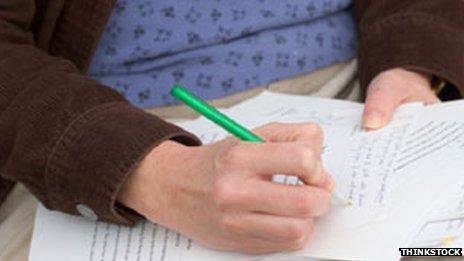Schools 'may look overseas for new teachers'
- Published

Some potential recruits are put off by the workload
Schools could start to look overseas to fill teaching vacancies as a "ghastly" teacher training shortage in England starts to bite, expert say.
The latest figures on teacher trainee recruitment predict a 7% shortfall for next September - the third in a row.
Supply teacher agencies are now turning to Canada, Australia and the Irish Republic in search of trained teachers.
The government said it was confident it would meet demand, adding it offered Ā£25,000 bursaries for top trainees.
But the Association of School and College Leaders deputy general secretary, Malcolm Trobe, said head teachers across the country had been describing the recruitment situation as "ghastly", "really difficult" and "a disaster area".
"From Durham in the north-east, Taunton in the west, and in the south and east, the message is consistent around the country. People found last year the most difficult year to recruit teachers.
"It's not just in the traditionally difficult subject areas, such as maths and physics."
He added: "We have always had a number of overseas teachers, particularly in London. We are going to be moving back into that situation again."
He said he had raised the matter with government and urged ministers to look at both long- and short-term solutions, adding that recruiting from overseas was one of the major strategies that could be employed.
His comments came as the Department for Education published the latest statistics on its teacher training recruitment targets. They show some 19,213 trainees have been recruited to courses for primary school teachers - 93% of the target.
For secondary programmes, 91% of the target or some 12,943 were recruited. That is a shortfall of 2,278 teacher trainees against the target for September 2015.
But over the past three years, a shortage of more than 6,000 teachers has built up, analysis by Prof John Howson, of Data for Education, suggests.
"It started to affect schools two years ago, and it was worse last year. We predict things will get even more difficult next year," he said.
He said he knew of supply teacher agencies who were already turning to Canada, Australia and the Irish Republic to fill the gap.
'Catastrophe'
The government must take action if a fourth year of recruitment problems was to be avoided, he said. He also highlighted that the population bulge working its way through primary schools would soon hit secondaries.
The data also shows big shortfalls for certain key subjects such as maths where just 88% of the registration target was met, and in physics where just 67% of the total were registered.
Teacher supply expert Chris Waterman warned that next year would be a "catastrophe" as "all these trainees that we haven't got cannot be converted into the full-time posts".
Mr Waterman, who is also the chairman of the supply and teacher training advisory group, said schools in more challenging circumstances, such as those in coastal towns that already found it hard to recruit, would be hit the hardest.
He knew of a number of head teachers who had travelled to Canada on teacher recruitment trips, he said.
"In September 2015, many secondary pupils will either have no teacher or an untrained teacher in maths, physics and modern languages, and other shortage subjects.
"Places like Dover, Great Yarmouth and Blackpool will be at the back of the queue for teachers."
He added: "A secondary school student could do their entire GCSE course without ever having seen a single lesson from a maths specialist."
'Best and brightest'
A DfE representative said it always allocated more places on courses than were needed to ensure a high quality supply of teachers across England's classrooms.
"We never expect to fill to 100% of allocated places and we are confident we will continue to meet future demand.
"Despite a tightening labour market, trainee teacher recruitment is holding steady - with low vacancy rates in priority subjects like maths and science.
"We want the best and brightest teachers in our schools. That's why we are offering increased bursaries worth Ā£25,000 tax free to top graduates training in priority subjects, including physics, maths and languages and prestigious scholarships, to trainees in maths, physics, chemistry, and computing."